
The Rolling Stones are an English rock band formed in London in 1962. Active for six decades, they are one of the most popular and enduring bands of the rock era. In the early 1960s, the Rolling Stones pioneered the gritty, rhythmically driven sound that came to define hard rock. Their first stable line-up consisted of vocalist Mick Jagger, multi-instrumentalist Brian Jones, guitarist Keith Richards, bassist Bill Wyman, and drummer Charlie Watts. During their formative years, Jones was the primary leader: he assembled the band, named it, and drove their sound and image. After Andrew Loog Oldham became the group's manager in 1963, he encouraged them to write their own songs. Jagger and Richards became the primary creative force behind the band, alienating Jones, who had developed a drug addiction that interfered with his ability to contribute meaningfully.

Sir Michael Philip Jagger is an English singer and songwriter who has achieved international fame as the lead vocalist and one of the founder members of the rock band the Rolling Stones. His ongoing songwriting partnership with Keith Richards is one of the most successful in history. Jagger's career has spanned over six decades, and he has been widely described as one of the most popular and influential frontmen in the history of rock music. His distinctive voice and energetic live performances, along with Richards' guitar style, have been the Rolling Stones' trademark throughout the band's career. Jagger gained press notoriety for his romantic involvements and illicit drug use, and was often portrayed as a countercultural figure.
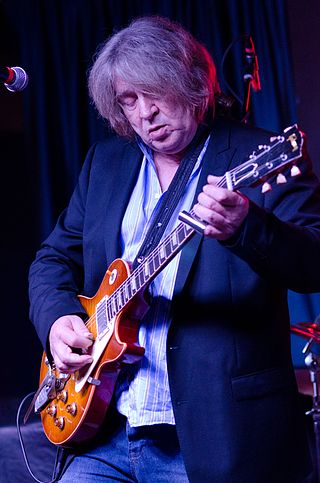
Michael Kevin Taylor is an English guitarist, best known as a former member of John Mayall's Bluesbreakers (1967–1969) and the Rolling Stones (1969–1974). As a member of the Stones, he appeared on: Let It Bleed (1969), Get Yer Ya-Ya's Out! The Rolling Stones in Concert (1970), Sticky Fingers (1971), Exile on Main St. (1972), Goats Head Soup (1973) and It's Only Rock 'n Roll (1974).
Bobby Howard Byrd was an American rhythm and blues, soul and funk singer, songwriter, musician, record producer, bandleader and talent dedicated, who played an integral and important part in the development of soul and funk music in association with James Brown.
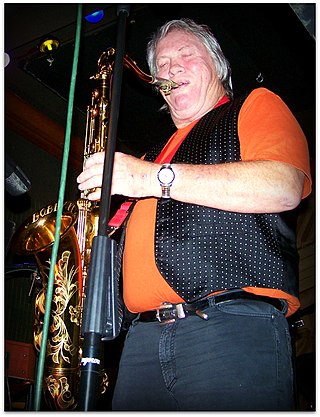
Robert Henry Keys was an American saxophonist who performed as a member of several horn sections of the 1970s. He appears on albums by the Rolling Stones, Lynyrd Skynyrd, Harry Nilsson, Delaney & Bonnie and Friends, George Harrison, John Lennon, Eric Clapton, Joe Cocker and other prominent musicians. Keys played on hundreds of recordings and was a touring musician from 1956 until his death in 2014.
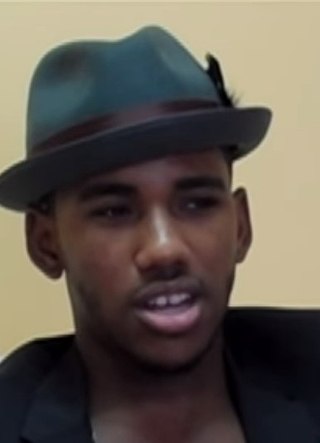
Brandon Mychal Smith is an American actor, singer, dancer, and rapper. He is best known for playing Bug Wendal in Gridiron Gang, Li'l Danny Dawkins in Phil of the Future, Nico Harris in Sonny with a Chance and So Random!, Stubby in Starstruck, Lord of da Bling in Let It Shine, and Marcus in One Big Happy. He received critical acclaim for his portrayal of Tayshawn Mitchell in The Ron Clark Story (2006) and Little Richard in the 2014 James Brown biopic Get on Up. He voices Michelangelo in the Nickelodeon animated series Rise of the Teenage Mutant Ninja Turtles.
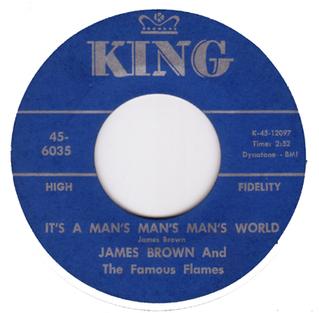
"It's a Man's Man's Man's World" is a song written by James Brown and Betty Jean Newsome. Brown recorded it on February 16, 1966, in a New York City studio and released it as a single later that year. It reached No. 1 on the Billboard R&B chart and No. 8 on the Billboard Hot 100. Its title is a word play on the 1963 comedy film It's a Mad, Mad, Mad, Mad World.

The Famous Flames were an American Rhythm and blues, Soul vocal group founded in Toccoa, Georgia, in 1953 by Bobby Byrd. James Brown first began his career as a member of the Famous Flames, emerging as the lead singer by the time of their first appearance in a professional recording, "Please, Please, Please", in 1956.
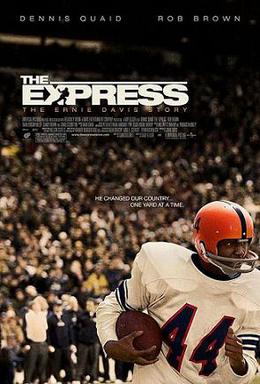
The Express: The Ernie Davis Story is a 2008 American sports film produced by John Davis and directed by Gary Fleder. The storyline was conceived from a screenplay written by Charles Leavitt from a 1983 book Ernie Davis: The Elmira Express, authored by Robert C. Gallagher. The film is based on the life of Syracuse University football player Ernie Davis, the first African American to win the Heisman Trophy, portrayed by actor Rob Brown. The Express explores civil rights topics, such as racism, discrimination and athletics. It was the film debut of Chadwick Boseman as Floyd Little.

Nelsan Ellis was an American actor and playwright. He achieved critical acclaim for his portrayal of Lafayette Reynolds in the HBO television series True Blood (2008–2014), for which he won a Satellite Award from the International Press Academy, among other accolades. He also starred as Shinwell Johnson in Elementary from 2016 to 2017, and played a variety of guest roles in other television series, including Veronica Mars and Without a Trace.

Chadwick Aaron Boseman was an American actor. During his two-decade career, Boseman received multiple accolades, including two Screen Actors Guild Awards, a Golden Globe Award, a Critics' Choice Movie Award, a Primetime Emmy Award, and an Academy Award nomination.

Tate Taylor is an American filmmaker and actor. Taylor is best known for directing The Help (2011), Get on Up (2014), and The Girl on the Train (2016).
Robert J. Bennett, better known as Bobby Bennett, was an American singer, songwriter, choreographer, comedian, and musician, noted for being a member of the vocal group The Famous Flames from 1958 to 1968. During his time in the group, he served as a singer, songwriter, instrumentalist, comedian, emcee and dancer in the James Brown Revue. He was inducted into the Rock and Roll Hall of Fame as a member of The Famous Flames in 2012.

42 is a 2013 American biographical sports film about baseball player Jackie Robinson, the first black athlete to play in Major League Baseball (MLB) during the modern era. Written and directed by Brian Helgeland, the film stars Chadwick Boseman as Robinson, alongside Harrison Ford, Nicole Beharie, Christopher Meloni, André Holland, Lucas Black, Hamish Linklater and Ryan Merriman in supporting roles. The title of the film is a reference to Robinson's jersey number, which was universally retired across all MLB teams in 1997.
William H. Slaughter is an American film and television actor, best known for his roles in The Campaign and Focus. In his free time he works with students that want to become actors and actresses at Launch Model And Talent in Metairie, Louisiana.

Marshall is a 2017 American biographical legal drama film directed by Reginald Hudlin and written by Michael and Jacob Koskoff. It stars Chadwick Boseman as Thurgood Marshall, the first African American Supreme Court Justice, and focuses on one of the first cases of his career, the State of Connecticut v. Joseph Spell. It also stars Josh Gad, Kate Hudson, Dan Stevens, Sterling K. Brown, and James Cromwell.
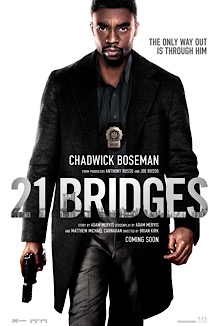
21 Bridges is a 2019 American action thriller film directed by Brian Kirk and written by Adam Mervis and Matthew Michael Carnahan, based on a story by Mervis. The film stars Chadwick Boseman as an NYPD Detective who shuts down the 21 river crossings of Manhattan to find two suspected cop killers, portrayed by Stephan James and Taylor Kitsch. Sienna Miller, Keith David and J. K. Simmons appear in supporting roles. The film was produced by brothers Joe and Anthony Russo, Mike Larocca, Robert Simonds, Gigi Pritzker, Boseman and Logan Coles.

T'Challa is a fictional character portrayed by Chadwick Boseman in the Marvel Cinematic Universe (MCU) media franchise—based on the Marvel Comics character of the same name—commonly known by his appointed title of Black Panther. He is depicted as the king of the fictional African nation of Wakanda, which is represented by a inherited costumed mantle evocative of their patron goddess, Bast. He initially came into conflict with some of the Avengers but later allies with them against Thanos, before having a son, being Blipped, and succumbing to an undisclosed illness.

Ma Rainey's Black Bottom is a 2020 American drama film directed by George C. Wolfe and written by Ruben Santiago-Hudson, based on the 1982 play of the same name by August Wilson. The film stars Viola Davis, Chadwick Boseman, Glynn Turman, Colman Domingo, and Michael Potts. Inspired by the career of Ma Rainey, an influential blues singer and the title character, the film dramatizes a turbulent recording session in 1920s Chicago.
Get On Up: The James Brown Story is the soundtrack to the 2014 film of the same name directed by Tate Taylor, based on the life of singer James Brown, and is played by Chadwick Boseman in the film. The album featured 20 songs which also include live renditions of tracks performed by Brown in concert tours but remained unreleased to the public, and five of the tunes which are newly produced and arranged by the record production duo Underdogs. The music was positively received by critics and nominated for Grammy Award for Best Compilation Soundtrack for Visual Media.
















